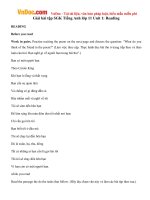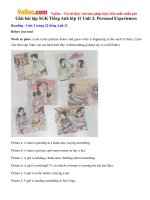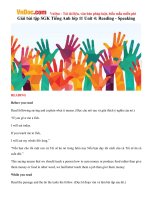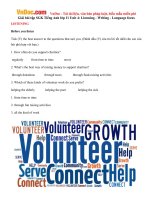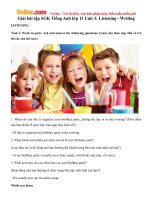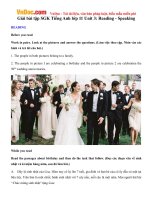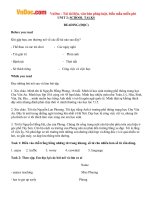Giải bài tập SGK Tiếng Anh lớp 11 Unit 2: Personal Experiences
Bạn đang xem bản rút gọn của tài liệu. Xem và tải ngay bản đầy đủ của tài liệu tại đây (318.22 KB, 8 trang )
VnDoc - Tải tài liệu, văn bản pháp luật, biểu mẫu miễn phí
Giải bài tập SGK Tiếng Anh lớp 11 Unit 2: Personal Experiences
Reading - Unit 2 trang 22 tiếng Anh 11
Before you read
Work in pairs. Look at the pictures below and guess what is happening in the each of them. (Làm
việc theo cặp. Nhìn vào các hình dưới đây và đoán những gì đang xảy ra ở mỗi hình.)
Picture a: A man is pointing at a bank-note, saying something.
Picture b: A man is giving a girt some money to buy a hat.
Picture c. A girl is holding a bank-note, thinking about something.
Picture d: A girl is watchingT.V, on which a woman is wearing the hat she likes.
Picture e: A girl is at the hatter’s buying a hat.
Picture f: A girl is stealing something in boy's bag.
VnDoc - Tải tài liệu, văn bản pháp luật, biểu mẫu miễn phí
While you read
Read the stop, and then do the tasks that follow. (Đọc câu chuyện và sau đó làm bài lập sau.)
MY MOST EMBARRASSING EXPERIENCE
Điều đáng xấu hổ nhất của tôi
Điều đáng xấu hổ nhất của tôi đã xảy ra cách đây vài năm, khi tôi còn là một học sinh lớp 9.
Tronegnhững ngày đó, ước mơ lớn nhất của tôi là có được một chiếc mũ màu đỏ, một chiếc mũ bằng
bông mềm như một trong những ngôi sao nhạc pop, Thần tượng của tôi đội trong video clip của cô ấy.
Tôi nghĩ rằng tôi sẽ cảm thấy rất tuyệt khi đội nó.
Cha tôi biết điều này, vì vậy vào ngày sinh nhật của tôi, ông đã cho tôi một số tiền để tôi có thể mua
chiếc mũ cho chính mình. Tôi rất vui mừng và quyết định đi đến cửa hàng ngay lúc ấy. Tôi đã lên xe
buýt và ngồi xuống bên cạnh một cậu học sinh cùng độ tuổi với tôi. Cậu bé liếc nhìn tôi và quay đi.
Có một cái nhìn lén lút trên gương mặt của cậu ấy, nhưng tôi không nghĩ nhiều về điều đó. Tôi đang
bận tưởng tượng làm thế nào khi tôi đội chiếc mũ đỏ. Sau một lúc, tôi quay lại và nhìn thấy chiếc cặp
của cậu bé đã được mở. Bên trong đó, tôi thấy một nắm đô la ghi chú chính xác giống như những tờ
đô la mà cha tôi đã trao cho tôi. Tôi nhanh chóng nhìn vào những tờ ghi chú trong túi của tôi nhưng
chúng đã biến mất. Tôi chắc chắn rằng cậu bé là một tên trộm. Cậu ấy đã lấy trộm tiền của tôi. Tôi
không muốn làm ổn ào lên, vì vậy tôi quyết định chỉ lấy tiền của tôi trở lại từ túi của cậu ấy. mà
không nói một lời nào về nó. Nên tôi cẩn thận đặt tay vào túi của cậu ấy, lấy các ghi chú và đặt nó trở
lại vào trong túi của riêng tôi.
Với số tiền tôi đã mua chiếc mũ xinh đẹp như mơ của tôi. Khi về nhà tôi đã khoe với cha tỏi.
Cha tôi hỏi: "Làm thế nào con trả tiền cho chiếc mũ đó?”
Tôi trả lời: "Thưa cha, tất nhiên là với số tiền cha dã cho nhân ngày sinh nhật của con”. Ông chỉ vào
một nắm đô la ghi chú trên bàn và hỏi: "Ồ? Kia là cái gi?" Bạn có thể tưởng tượng tôi cảm thấy thế
nào sau đó không?
Task 1. The words/ phrases in the box all appear in the passage. Use them to fill in the blanks in the
sentences (Tất cả các từ/ cụm từ trong khung xuẩl hiện ở đoạn văn. Dùng chúng đế âứn vào chỗ trong
ờ các câu.)
VnDoc - Tải tài liệu, văn bản pháp luật, biểu mẫu miễn phí
making a fuss
1. glanced
sneaky
glanced
2. making a fuss
embarrassing
3. embarrassing
idols
4. idols
5. sneaky
Task 2. Work in pairs. Put the pictures of the events (on page 22) in the order they happened in the
story. (Làm việc theo cặp. Đặt những tranh cùa sự kiện (ở trang 22) theo đúng thứ tự chúng xuất hiện
trong câu chuyện. )
Picture 1 - d
Picture 2 - b
Picture 3 - f
Picture4-e
Picture 5 - a
Picture 6-c
Task 3. Answer the questions. (Trả lời các câu hỏi.)
1. What did she wish to have when she was in trade 9?
- A red floppy cotton hat.
2. Who gave her money on her birthday?
- So that she could buy the hat for herself/ to buy the hat for herself.
3. Why did she decide to take the money from the boy's bag?
- A wad of dollar notes exactly like the ones her father had given her before.
4. What did she do with the money?
- Because she didn't like to make a fuss.
5. What did she discover when she came back home?
- She bought her hat with it.
After you read
Discussion the question: What do you think the girl had to do after she discovered that the money she
had taken from the boy's bag was not hers? (Làm việc theo nhóm. Thảo luận những câu hỏi. Em nghĩ
cô gái phải làm gì sau khi cô khám phá ra tiền cô lấy ở cặp của cậu bé không phải là tiền của cò.)
* Suggestions
- She might feel embarrassed because that was not her money
VnDoc - Tải tài liệu, văn bản pháp luật, biểu mẫu miễn phí
- Perhaps the girl could place a notice on a local newspaper to apologize the boy and contact him to
give the money back.
- Perhaps the girl might want to tell her father the truth and ask him for help.
* Suggestions
- Perhaps she could come to the police station, tell the police the truth and ask them for help.
- Maybe the girl could get on the same bus next day and look for the boy to return him the money.
Speaking - Unit 2 trang 25 tiếng Anh 11
Task 1. Work in pairs. Match the things you might have done or epxerienced in box A with how the
experience might have affected you in box B. (Làm việc theo cặp. Ghép những điều em có thể đã làm
hoặc trải qua ở khung A và điều trải qua đó ảnh hưởng đến em như thế nào ở khung B.)
1 –d
2-c
3-a
4-b
5-e
Task 2. Work in pairs. A student talks to her friend about one of her past experiences. And how it
affected her. The lines in their conversation are jumbled. Put them in the correct order, then practice
the dialogue. (Làm việc theo cặp. Một học sinh đang nói chuyện với bạn của cô ấy về một trong
những điều trải qua của mình trong quá khứ và nó ảnh hưởng đến cô như thế nào. Những câu trong
cuộc đối thoại của họ đã bị đảo lộn. Đặt chúng lại đúng thứ tự, sau đó thực hành bài đối thoại.)
1. b: Have you ever spoken English to a native speaker?
2. d: Yes, I talked to an English girl last summer.
3. h: How did you meet her?
VnDoc - Tải tài liệu, văn bản pháp luật, biểu mẫu miễn phí
4. a: I was walking along Trang Tien Street when an English girl came up to meand asked me the way
to Hoan Kiem Lake. I told her, then we started talking about the lake.
5. e: What did you talk about?
6. g: Even thing about the lake: its name, the great turtles in it, etc.
7. c: How did the experience affect you?
8. f: We'll, it made me more interested in learning English.
Task 3. Work in pairs. Underline the structures used to talk about past experiences in the dialogue in
Task 2. then use the structures and the ideas in Task 1 to make similar dialogues. (Làm việc theo cặp.
Gạch dưới những cấu trúc được dùng nói về những điều trải qua trong quá khứ ở bài đối thoại 2, sau
đó dùng những cấu trúc này và những ý tưởng ở bài đối thoại 1 để thực hiện bài đối thoại tương tự)
a.
A: So, how was your weekend?
B: Oh, really good. I happened to see Cam Ly.
A: The famous singer?
B: That's rittht. Have you ever met her?
A: Yes, I have. In one of her show in Ho Chi Minh City last years. She is very charming.
B: Yes. She sings beautifully, too.
A: Have you ever been to Ho Chi Minh City?
B: No, I've never been there.
A: You should go there sometime. It's an interesting city and the hotels are wonderful.
b.
A: Have vou ever been seriously ill?
B: Yes. and I had to be away from home for nearly to weeks.
A: How did you become so ill?
VnDoc - Tải tài liệu, văn bản pháp luật, biểu mẫu miễn phí
B: I was in the rain in a winter afternoon for hours.
A: How did that happen?
B: Well. I went for a picnic and didn't bring my raincoat.
A: How did the experience affect vou?
B: It made me appreciate my health more.
Listening - Unit 2 trang 27 tiếng Anh11
Before you listen
Work in goups. Look at the picture and say what is happening in it. (Làm việc theo nhóm. Nhìn hình
và nói điều gì đã xảy ra ở đấy.)
In the picture, we see:
- a house is on fire.
- The fire brigade is ftshting to put out the fire:
- And people are running away with the firemen's help.
Task 1. Christina is being interviewed about the most unforuettable experience in her life. Listen to
the interview, and then decide whether the statements are true (T) or false (F). (Christina đang được
phỏng vấn về một điều đã trải qua không thể quên trong cuộc đời cua cô ấy. Nghe bài phỏng vấn và
sau đó quyết định những câu nói đúng (T) hay sai (F)).
VnDoc - Tải tài liệu, văn bản pháp luật, biểu mẫu miễn phí
1. T
2. F (13 years ago)
3. F (not because of the flight because of the gas stove)
4. F (not reading a book, sleeping)
5. T (her mother came and rescued her)
Task 2. Listen to the second part of the dialogue and fill in the gaps in the summary of Christina's
stop, below (Nghe phần hai của bài đối thoại và điền những chỗ trống của bài tóm tẳt câu chuyện của
Christina dưới đây.)
1. small
2. Everything
3. family
4. replaced
5. Took
6. love
After you listen
Christina says that family is more important than things. Do you agree with her? Why? Exchange
your ideas with a parner. (Christina nói rằng gia đình quan trọng hơn đồ vật. Bạn đồng ý với cô ấy
không ? Tại sao? Trao đổi với một bạn học của bạn.)
Suggestion:
I agree with her because family is important. You can get back things you’ve lost, but when you lose
your family, you lose everything...
Writing - Unit 2 trang 28 tiếng Anh 11
Writing a personal letter about a past experience. (Viết một là thư cá nhân về một điều trải qua trong
quá khứ.)
Dear Huong.
Last night I had a scary dream. I was walking along an empty street late at night. Suddenly a lion
appeared at the end of the street. He ran toward me with his big mouth open and sharp teeth. He
roared and jumped upon me. I screamed loudly and awoke. I'm still frightened now. By the way, how
have similar problems now. Write to me as soon as possible.
VnDoc - Tải tài liệu, văn bản pháp luật, biểu mẫu miễn phí
Language forcus - Unit 2 trang 29 tiếng Anh 11
Exercise 1. Use the correct present tense forms of the verbs in brackets in the story below. The first
one has been done for you as an example.
1. invites
4. Waves
7. Contains
10. Is shining
2. sets
5. promises
8. has baked
11. Are singing
3. gets
6. Carries
9. Is
12. is
Exercise 2. Complete the sentences by putting the verbs into the past simple or past progressive.
1. broke/ was piavina
2. wrote/ was
3. was working/ broke
4. started/ were walk in a
5. told/ were having
6. didn't listen/ was thinkins
7. phoned/didn't answer/ were... doing
8. was not wearing/ didn't notice/ was driving
Exercise 3. Write the sentences, putting the verbs in each sentence into the past simple or the past
perfect.
1. had been/ arrived
2. found/ had taken
3. got/ had closed
4. got/ had left
5. got/ had arrived
6. paid/ had phoned
7. went/ said/ hadn't arrived
8. had looked/ asked/ cost
